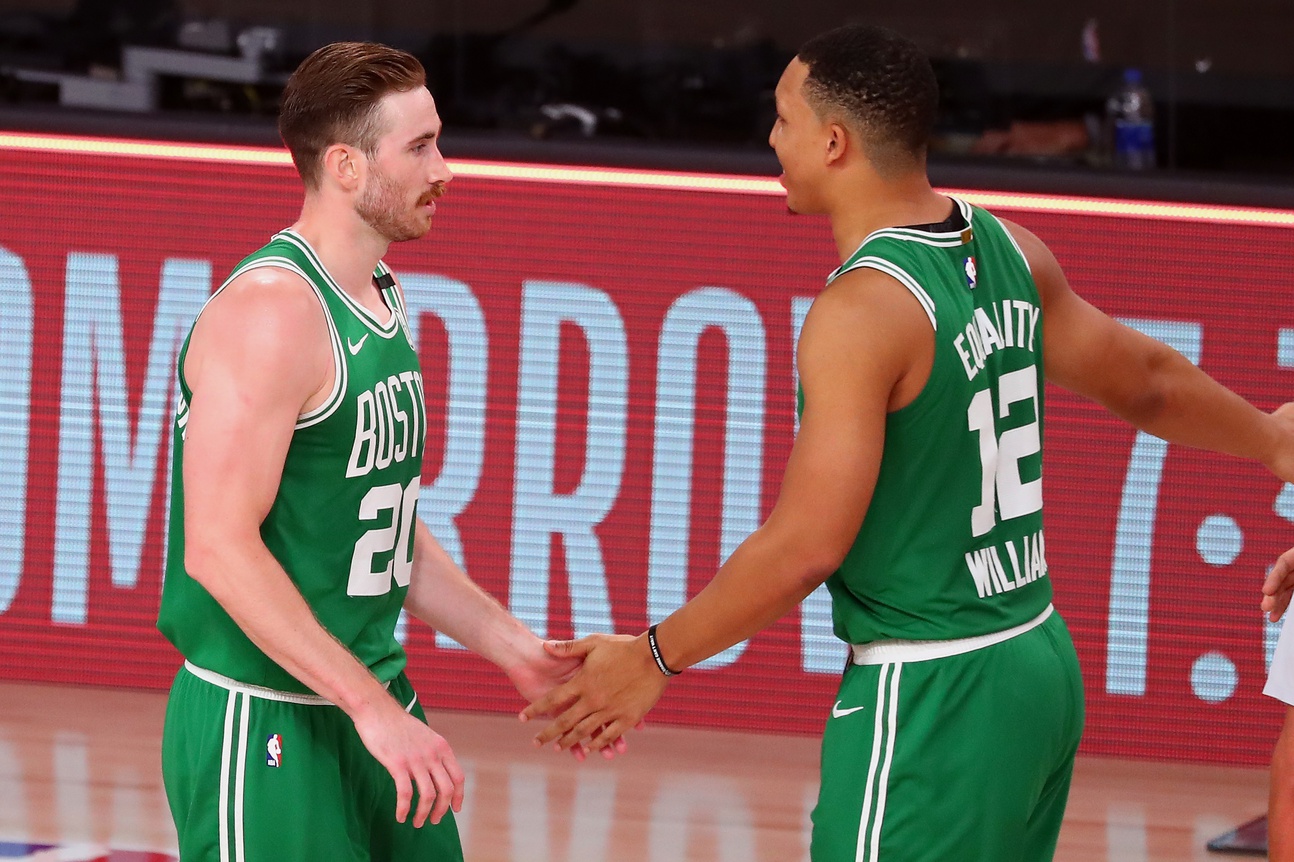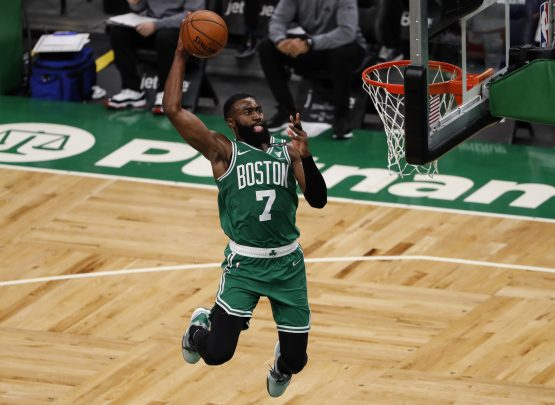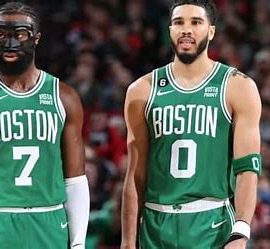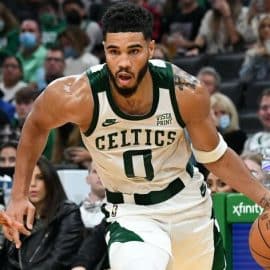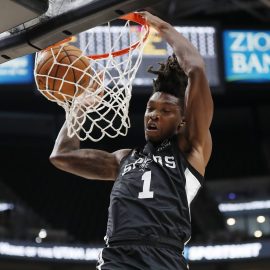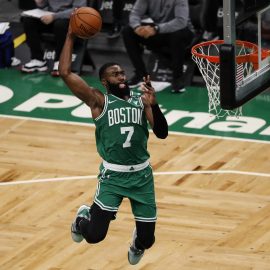Every morning, we compile the links of the day and dump them here… highlighting the big storyline. Because there’s nothing quite as satisfying as a good morning dump.
“We’re a family,″ said Smart. “Families fight all the time. I fight with my brothers all the time. But at the end of the day we can fight with each other, nobody else can.
“It happens between families, especially a family like ours that has been together for so long. It’s going to happen. We’ve got a lot of guys who play their hearts on their sleeves night in and night out. We weren’t supposed to be happy down, 2-0, especially those two games that we gave up.
…
“I would have been more worried after that Game 2 loss if everybody was calm, cool and collected,″ said Smart. “That would have been a problem. I hate losing more than I love winning and I think I play with a lot of guys who feel the same way.
It’s been interesting watching Marcus Smart grow into the team’s de facto captain over the past six seasons. As I sit here, I’m hard pressed to remember an example of Smart losing control of his temper in a way that negatively affected the team since the J.R. Smith incident in the 2018/19 preseason.
A bit of research reminds me that he got tossed from a game in March 2019 after shoving Joel Embiid.
But that’s pretty much it. In the same way that Smart’s three point shooting percentage has improved because he’s become more disciplined about where and how he shoots, his contributions to the morale of the team have improved as he’s learned where and how to channel his anger.
Granted, the display on Thursday night was a bit extreme. But bear in mind that this is a guy who used to do property damage when he got sufficiently upset. He’s still a work in progress, but that’s not what’s important–we’re all works in progress, really–it’s that he’s working on who he is.
In any event, I for one am not worried about game 4. The media has been blowing smoke up Miami’s ass for the past few weeks, such that we tend to forget that they were a good-not-great team in the regular season and that their trip to the ECF was greased by Mike Budenholzer’s typical playoff collapse.
John Hollinger, for one, touts Miami’s supposedly superior conditioning:
The basic fact is that the Celtics keep running out of gas at the end of games, and conversely that the Heat are in much better shape.
Just because Boston won Game 3 doesn’t change anything else about this fact. The Boston Bonk came just as sharply as in the first two games, it just so happened that the Celtics had built a 20-point cushion first.
More generally, conditioning has been a little-discussed piece of these playoffs that has actually played a massive role as we’ve gone deeper. It proved critical both in Denver’s shocking zip past the Clippers in the West semifinals, and in Miami’s unexpectedly winning of six of eight games against Milwaukee and Boston in the East.
In Hollinger’s piece much time is spent talking about how Miami limits the minutes of its starters. It’s not until about halfway through the article that Hollinger apparently remembers that, oh yes, the Celtics have been without the services of one of their best players since game 2 of the first round. And down towards the end of the article he serves up this item:
The fascinating game-within-a-game here is whether this is Spoelstra’s moment to leverage his team’s superior conditioning to this point by upping the minutes on his six best players and mostly, er, deep-sixing the rest. If Herro and the five starters each play 38 minutes, he only needs to find 14 for the rest of his bench – likely Olynyk or zone-defense specialist Derrick Jones Jr.
See, I don’t know that at any point in time Hollinger proves that Miami is in better shape than Boston. Just that their starters have played fewer minutes, which is a trivial consequence of Boston losing a starter to injury in the first game of the playoffs.
That starter, mind you, is back and while he was winded at times in game 3 (which was no doubt part of the reason why the C’s faded late yet again), he’s had three days off not to rest and recuperate, but to work out in the gym getting his game legs back under him.
“He hasn’t played in four-and-a-half weeks, so 30 minutes was a huge plus,” Brad Stevens said on Monday. “And it was one of those deals where he looked pretty good the whole time. He asked to be taken out a few times, but I thought for the most part looked pretty good. That now is a good thing because he knows he can do that, and it’s good that we had this little break in between and knowing that was important.”
I’m not worried about Hayward’s pedestrian stat line from game 3. It was the first he’d played competitively in 32 days. Honestly, it’s a tribute to his basketball IQ that he was able to make only two of seven shots in 31 minutes and still finish +1. Hayward is a guy who, like Horford, makes the right play so often that he seems to be a non-factor in games where he’s not the center of attention.
If Hayward’s going off, you know about it because anybody can see when a guy’s hot. But the value of a guy like Hayward comes when he’s playing a regular game, because a regular game for Hayward has him shooting when he should shoot, passing when he should pass and drawing defenders when he should draw defenders. Hayward makes life easier for everyone else on the court.
Page 2: Don’t expect to see much of the ‘best five’ lineup
And so therein lie some of the inherent flaws. This lineup can only work situationally. It’s not like the Golden State Warriors “lineup of death” because Boston doesn’t have a Draymond Green to anchor the defense. That lineup also, obviously, has much better offensive players, but the point of the comparison is that the Warriors could deploy that at any time against anyone and it would work. Boston has to wait for the right moment.
Miami is already cooking up counters to this if Boston tries it again with Adebayo on the floor. The most obvious move would be to have Adebayo fake his dribble handoff, which he did in the second half.
One of the narratives over the past two series has been the occasional effectiveness of Miami and Toronto zone defense. I say ‘occasional’ because Boston has had double-digit leads in the second halves of nine of the ten games they’ve played against those two teams, so the zone isn’t that effective.
But when switching to zone has been effective, it’s been effective not because of any particular value to the scheme. Rather, its effectiveness comes from its novelty. As a general rule, zone defenses are eminently exploitable. But when a 3rd year guy like Tatum is confronted with a man defense that morphs into a zone configuration while he’s initiating a set, the sheer novelty of the scheme can be effective.
However, novelty by its very nature cannot be a long-term strategy. And that, honestly, is the case with Boston’s ‘best five’ lineup. Prior to Saturday’s game, the Celtics had only rolled with that lineup for 32 possessions in 2019/20. It’s a lineup that the C’s have probably experimented with plenty in practice, but which has produced a vanishingly small amount of film for other coaches to break down.
Once Miami ‘solves’ the C’s ‘best five’ lineup, they’ll give every other team in the league a strategy for beating it.
So I expect Stevens to deploy that lineup tactically–or surgically, if you prefer that metaphor. A quick-strike option deployed at the ends of quarters or at other opportune moments.
Finally: Musing on Hayward’s decision to stay in the bubble
Over the weekend, Hayward revealed that he’s going to stay in the NBA bubble even if his wife goes into labor.
That news has me thinking about just how odd professional sports–and indeed, the whole entertainment industry–is.
Imagine that you hear about a guy who’s, say, an auditor for a big four accounting firm. The job requires a ton of travel, but it pays well and his family lives comfortably.
Now say that his wife’s going into labor and instead of staying home with her and, y’know, actually experiencing the terrifyingly joyful moment of childbirth, he decides that he’s going to fly off to Atlanta to look at Coca-Cola’s books.
What a bastard, right?
So if we’d have a lower opinion of a guy who puts his job ahead of his family when that job is arguably more important than playing basketball, why do we have the opposite attitude toward a decision like Hayward’s?
The answer, of course, is that a not insignificant chunk of our own happiness is tied up in what the Celtics do this season. The amount varies from person to person, but for all Celtics fans, it’s definitely a non-zero amount.
Conversely, none of us care when or how most other jobs are performed.
Also, Hayward’s job probably means more to him than an accountant’s job means to the person performing it. Even though Hayward’s job involves playing a game, not doing something of lasting importance.
So essentially, when we applaud a guy like Hayward for staying in the bubble, we’re applauding him for putting his own happiness and the happiness of fans–who are total strangers to him–over an irreplaceable family moment.
Hayward isn’t getting paid $33 million per year to play a game. He’s getting paid that much to put playing that game ahead of almost everything else.
I’d be lying if I said that I’m not excited that Hayward will be with the team through the rest of the playoffs. Honestly, his presence makes the Celtics even more legitimate title contenders, and I’d love to see the C’s win an 18th championship.
But that excitement is tinged with the realization that Hayward’s presence with the C’s means missing something that he probably should be present for.
The rest of the links
MassLive: Boston Celtics’ Marcus Smart on locker-room argument following Game 2: ‘It was electrifying’
Boston Herald: Back to work: Celtics, Heat start getting ready for Game 4
NBC Sports: Celtics Mailbag: Playoff Gordon Hayward, missing Tyler Herro, and gazing into Boston’s future | Blakely: Is small ball lineup a game-changer for the Celtics? | Forsberg: Are C’s closer after ‘electrifying’ shouting match? Marcus Smart thinks so
Add The Sports Daily to your Google News Feed!
